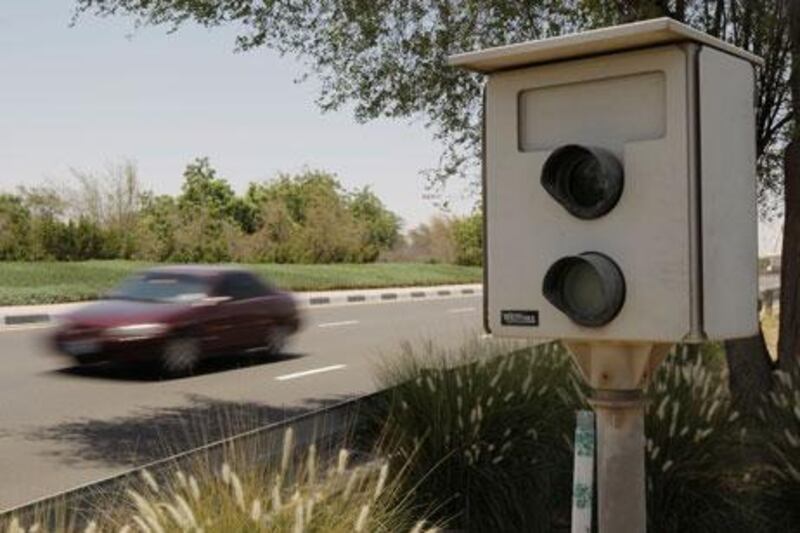ABU DHABI // The “buffer” that allows drivers in Abu Dhabi to exceed the speed limit by up to 20kph without penalty is to be cut, and in some cases abolished.
Driving at more than 10 per cent above the limit will in future trigger a fine, and in residential areas there will be no leeway at all: limits of between 20kph and 40kph will be strictly enforced.
The changes will take effect in two years’ time in an effort to reduce speed-related accidents, Brig Gen Hussein al Harethi, the head of the Abu Dhabi Police Traffic and Patrol Directorate, said yesterday.
“Studies show that exceeding the speed limit is a common cause for accidents. And our aim is to protect drivers and the community,” the officer said.
Road safety consultants welcomed the stricter enforcement of speed limits and said reducing the speed buffer would help to reduce the number of speed-related accidents.
“I think this is a positive step forward,” said Mustafa Issa el Wazani, a senior engineering inspector at the National Transport Authority. “If we implement this correctly, it will have a huge impact in terms of safety.”
Experts said awareness and consistency were crucial in enforcing a rule that drastically affected driver behaviour. Drivers should not be under the impression that some radars did not function, or that some were more lenient than others.
“This is definitely a recommended initiative, but it needs to be properly applied and enforced,” said John Hughes, the regional manager for ARRB Group, a road safety research and consulting organisation. “People need to know that they won’t be able to get away with speeding.”
Mr Hughes said that while driving behaviour varied, the consistent application of traffic laws would help to bring down the speed gap, which also posed a threat to motorists. “If these rules are enforced consistently,” he said, “they will help to reduce the variation between faster and slower cars.”
Dubai recorded a 25.6 per cent drop in traffic accidents last year compared with 2009, which officials attributed to more rigorous enforcement. The emirate has introduced 32 fixed radar units and 39 mobile radar units since 2008.
However, experts said road contexts also need be considered when assigning speed limits and their buffers.
Mr el Wazani said that he thought there were too many radar spots in Dubai, which may be having a negative impact on traffic.
“If you look at Jumeirah, for example, the speed limit is too low considering the nature of the road,” he said.
Speed limits that were too low could hamper traffic flow, Mr el Wazani said. “I completely agree in enforcing these speed limits in residential areas, but not on main roads.”
Drivers in Abu Dhabi agreed that the reduction in speed buffers would improve road safety, but they also placed emphasis on creating awareness.
“This should have happened a long time ago,” said Hana Tawfiq. “Drivers are now used to the current buffer. There will need to be a huge awareness campaign and advertising to support this so that drivers aren’t receiving numerous tickets without understanding why.”
Wagih Chehade, who commutes between Musaffah and the city, said that in addition to adding speed buffers, a minimum speed should be imposed.
“This decision presents advantages and disadvantages,” he said. “Those people who drive slowly, they’ll go even more slowly. They should put a minimum speed limit so that traffic keeps moving.”
Brig Gen al Harethi said all speed-limit signs in Abu Dhabi had now been updated to reflect the new limits that came into effect on January 1.
"Some drivers see that the speed-limit signs have not changed and assume that they have not been updated," he said. "That's because the speed limit has not been changed on all roads. All speed-limit signs are updated and accurate."
mismail@thenational.ae






